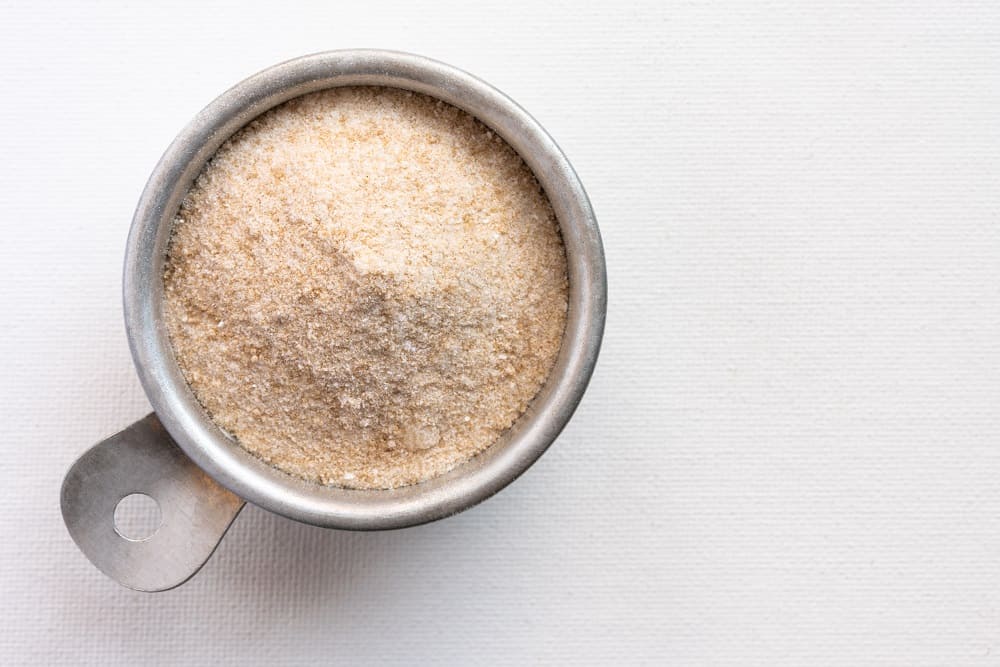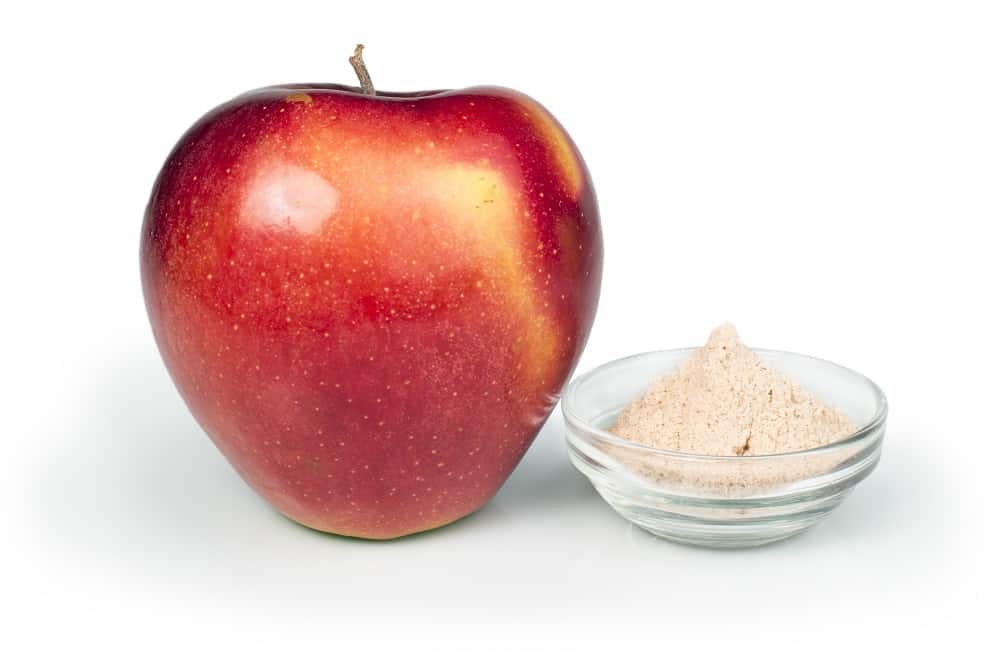A ubiquitous natural polymer found in the primary cell walls of non-woody plants, pectin is largely and increasingly used as a gelling and stabilizing agent due to its hydrocolloid properties. The ingredient is further explored as a fat replacer and a health-promoting functional ingredient.
Pectin is considered to be vegan as it is primarily obtained from plant sources – specifically from the peels and pomaces of citrus and apples respectively.
Table of Contents
Pectin

A structural heteropolysaccharide (i.e., composed of different kinds of linked sugars), pectin is found in the primary cell walls of terrestrial plants. The substance is typically found in packaging labels listed as “pectin.” However, it can also be listed by its E number: E440. It can be further denoted depending on its chemical composition. Amidated (i.e., containing amine) pectin is E440(i) while non-amidated pectin is E440(ii) (1).
Due to the complex chemical structure of pectin, it is heavily used in the food industry as a gelling agent and stabilizer. Composed of intricately linked and long chains of sugar, pectin can affect the viscosity of a food product as it acts like a net that holds the matrix of the food product together.
Pectin is also used in the food industry as an emulsifier. Food products can often contain ingredients that are chemically polar opposites such as two immiscible liquids. As an emulsifier, pectin can act as surface-active agents that keep the solution properly mixed.
Along with a variety of natural polysaccharides such as chitosan derivatives, alginate, cellulose, seaweed extract, and seaweed, pectin is also being explored as a food packaging material – typically in the preparation of edible films and coatings. Being naturally flexible, pectin can be used in many biodegradable packaging materials that serve as moisture, oil, and aroma barrier. It can also reduce respiration rate, and oxidation of food.
Nowadays, pectin is being explored as a fat or sugar replacer in low-calorie food products. Additionally, health benefits associated with pectin are being investigated. For one, the complex structure of pectin makes it a suitable dietary fiber. Furthermore, new evidence suggests that modified pectin has bioactive properties that can potentially be used against cancer (2).
Is Pectin Vegan?
Since pectin is exclusively obtained from plant sources, pectin is considered vegan. It is naturally found in plant-sourced products such as fruits and vegetables. As a food additive, industrial pectin is also largely acquired from plant sources and waste.
As a plant-derived material, vegans can actually find pectin in many vegan food products as pectin is a common substitute for non-vegan food additives. For example, pectin is a preferred gelling agent in vegan products compared to gelatin.
Pectin Production
Almost exclusively, pectin is extracted from citrus peels and apple pomace – byproducts from other industries such as juice manufacturers. While plant sources all have pectin, the two are found to have sufficient amounts of pectin: apple pomace contains about 10-15% of pectin on a dry matter basis while citrus peels have 20-30% more when compared to the apple pomace.
Alternative sources for pectin production include sugar beet waste, sunflower heads, and mango waste.
Conventionally, pectin is extracted from the raw materials using a water-based extraction. This process involves extracting the pectin using acidified water (pH up to 2) at temperatures no greater than 70°C. The extract is then filtered, and pectin is precipitated from the clear extract with ethanol or isopropyl alcohol.
Since the water-based extraction takes anywhere between 2-4 hours to run, some of the pectin can undergo a temperature-driven degradation. This can be avoided by quicker methods such as the microwave heating method. This method can heat the extract for 15 minutes and would produce an equivalent amount of pectin as the water-based extraction would if left to run for three hours.
Food that Contains Pectin

Naturally found in plant cells, it comes as no surprise that food items derived from plants contain varying amounts of pectin. Fruits are an excellent source of pectin. These include fruits with relatively harder consistencies such as pears, apples, plums, guavas, gooseberries, and citrus. Although typically lower in concentration, softer fruits (e.g., grapes, cherries, strawberries, etc.) also have pectin.
As a food additive, pectin can also be found in several food products as a gelling agent, thickener, or stabilizing agent. Jams, jellies, and marmalades are examples of food products that utilize pectin.
As an emulsifier, pectin can be found in low-fat dairy products, meat products, spreads, desserts, bakery products, sauces, and more.
Is Pectin Safe?
Since pectin can be naturally found in plant sources, various food safety authorities approve of the safety of pectin for human consumption. These food safety authorities rely on different toxicity studies and internal standards for their safety approval.
The JEFCA (Joint FAO/WHO Expert Committee on Food Additives) has evaluated pectin thrice from 1981 to 2016 (3).
Throughout those evaluations, the only concerns for re-evaluations were the safety of pectin for infant consumption. In 2014, re-evaluations limited the use of pectin in infant formula to a maximum level of 0.5%. However, that limit was reduced to 0.2% in the last re-evaluation back in 2016.
The FDA (Food and Drug Administration) also approves of pectin as it meets the specifications of the Food Chemical Codex (4). Considered to be GRAS (“generally recognized as safe”), the FDA permits the use of pectin in food products as long as good manufacturing practices are followed. The FDA also recognizes the use of pectin in the food industry as an emulsifier, a stabilizer, and a thickener.
The EFSA (European Food Safety Authority) is another food safety authority that approves of pectin for human consumption. Using various safety studies, the food safety authority concluded that both amidated and non-amidated pectin have no safety concerns for the general population and have no need for an acceptable daily intake (ADI) value (5).
However, just like with the JEFCA, the EFSA has also performed re-evaluations with pectin concerning infants. In 2021, the EFSA published an opinion regarding safety limits for pectin for infant consumption (6).
References
1. http://nopr.niscair.res.in/
2. https://www.sciencedirect.com/
4. https://www.accessdata.fda.gov/




